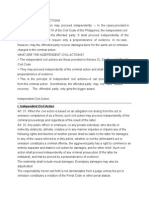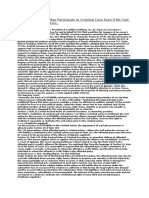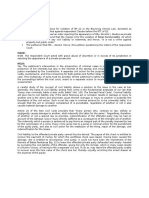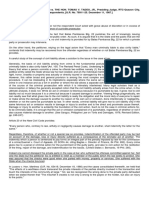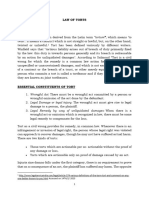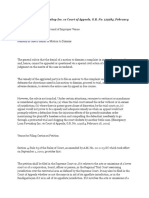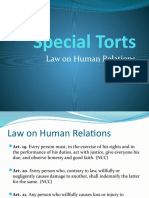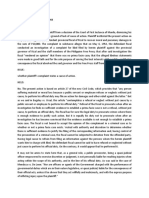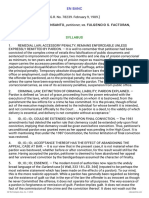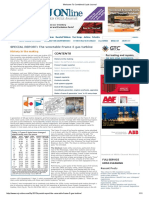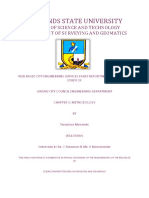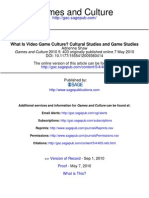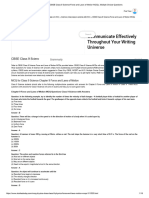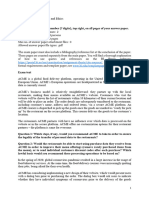Crispin Dasalla, SR
Crispin Dasalla, SR
Uploaded by
Gay C. Caragan-MakaniCopyright:
Available Formats
Crispin Dasalla, SR
Crispin Dasalla, SR
Uploaded by
Gay C. Caragan-MakaniOriginal Description:
Original Title
Copyright
Available Formats
Share this document
Did you find this document useful?
Is this content inappropriate?
Copyright:
Available Formats
Crispin Dasalla, SR
Crispin Dasalla, SR
Uploaded by
Gay C. Caragan-MakaniCopyright:
Available Formats
CRISPIN DASALLA,
SR., PETITIONER,
VS.
COURT OF FIRST
INSTANCE OF NUEVA
ECIJA, BRANCH IV AND
ROGELIO
SUMANGIL, RESPONDEN
TS.
G.R. No. L-51461 April 26, 1991
Facts:
Crispin Dasallas son died when a
passenger jeepney owned and driven by private
respondent Rogelio Sumangil. Dasalla then
instituted an action for the recovery of damages
sustained for the death of his son.
The complaint prayed for payment of
P30,000.00 moral damages; exemplary
damages in an amount left to the discretion of
the court, attorney's fees of P5,000.00 and
costs.
On preliminary hearing, the defendant
resuscitated his defense for the dismissal of this
case on the ground that there has been payment
of the obligation stated in the complaint. He
presented the Pinanumpaang Salaysay,
executed by the plaintiff Crispin Dasalla, Sr.,
before the Office of the Provincial Fiscal.
Plaintiff alleged that he executed the
Pinanumpaang Salaysay for the awe purpose of
the accused not going to jail.
Sumangil prayed for the dismissal of the
complaint. He denied the allegations of the
complaint and alleged that this civil obligations to
Dasalla was already settled because Dasalla
executed an affidavit condoning, waiving and
forgiving all others damages he may be entitled
to after receipt of P6,000.00 from Sumangil.
The trial court dismissed the compliant
based on the preponderance of the evidence
presented by the defendant and that the plaintiff,
a first year high school and presumably knew
what has been contained in said document.
Dasalla appealed
directly to the SC.
Issue:
Whether or not the "Sinumpaang
Salaysay" which was made the basis
of the dismissal of the complaint by the
trial court, is contrary to law, public
order, public policy, morals or good
customs, or prejudicial to a third
person with a right recognized by law.
Ruling:
No!
There is no law which prohibits a person who has
incurred damages by reason of the act of another from
waiving whatever' rights he may have against the latter.
If the act causing damage to another also constitutes a
crime, the civil liability arising from the criminal act may
also be validly waived.
What is not allowed is to compromise or to waive
the criminal aspect of a case. The reason or principle
underlying the difference between rights which may be
waived and rights which may not be waived is that those
rights which may be waived are personal, while those
rights which may not be waived involve public interest
which may be affected.
In a compromise or a waiver of the civil
aspect of the case, the restriction imposed by
law is that it must be entered into before or
during litigation, never after final judgment. A
compromise on the civil aspect of a case is valid
even if it turns out to be unsatisfactory to either
or both of the parties
In the case of Balite v. People, express
condonation by the offended party has the effect
of waiving civil liability with regard to the interest
of the injured party. Under Art. 112 of the RPC
civil liability arising from an offense is
extinguished in the same manner as other
obligations, in accordance with the provisions of
the civil law. Also, under Article 2034, Civil Code
reads: "There may be a compromise upon the
civil liability arising from an offense; but such
compromise shall not extinguish the public
action for the imposition of the legal penalty".
It is true that the minimum amount of
compensatory damages for death that may be
awarded to petitioner at the time of the death of his
son is P12,000.00. However, for reasons stated in
the "Sinumpaang Salaysay," petitioner voluntarily
released the private respondent from his civil
obligations.
The affidavit executed by the petitioner,
releasing the respondent from additional civil liability
arising from the death of the former's son, is legal. It
is not contrary to law, morals, good customs, public
policy or public order. Consequently, he can no
longer institute a complaint to recover damages
arising from the same incident subject of the
affidavit.
You might also like
- Hair Transplantation-Informa Healthcare 5th Ed. (2011)Document556 pagesHair Transplantation-Informa Healthcare 5th Ed. (2011)Ferdie YuzonNo ratings yet
- Introduction To BiochemistryDocument8 pagesIntroduction To BiochemistrySabin Devkota100% (2)
- Measures of Position Interpretation DLLDocument6 pagesMeasures of Position Interpretation DLLjohn kenneth arlando100% (2)
- Coursebooks 2020-21 NuevoDocument4 pagesCoursebooks 2020-21 NuevoNolano SilicianoNo ratings yet
- Reply To Petition For CertiorariDocument14 pagesReply To Petition For CertiorariMarissa DacayananNo ratings yet
- Independent Civil Action Vs Separate Civil ActionDocument5 pagesIndependent Civil Action Vs Separate Civil ActionColeen Navarro-Rasmussen100% (3)
- Effective Card MagicDocument142 pagesEffective Card Magickiki magestic80% (10)
- Dasalla V CFIDocument1 pageDasalla V CFIDidzNo ratings yet
- Civil Liability of A Person Guilty of FelonyDocument13 pagesCivil Liability of A Person Guilty of FelonyasdfghjkattNo ratings yet
- Rule 111Document27 pagesRule 111janbryle.cardenas.21No ratings yet
- Private Prosecutor May Participate in Criminal Case Even If No Civil Liability Exists in CrimeDocument3 pagesPrivate Prosecutor May Participate in Criminal Case Even If No Civil Liability Exists in CrimeSimon WolfNo ratings yet
- (DIGEST) Banal Vs Judge Tadeo JRDocument2 pages(DIGEST) Banal Vs Judge Tadeo JRJeff AguilarNo ratings yet
- Comelec Legal Assistance Office For Petitioner. Comelec Legal Assistance Officer For Private RespondentDocument3 pagesComelec Legal Assistance Office For Petitioner. Comelec Legal Assistance Officer For Private RespondentElle WoodsNo ratings yet
- HO 12 - Arts 100 - 113Document15 pagesHO 12 - Arts 100 - 113Charles Francis SagabaenNo ratings yet
- Digest and Full TextDocument31 pagesDigest and Full TextMariaAyraCelinaBatacanNo ratings yet
- Occena Vs IcaminaDocument4 pagesOccena Vs IcaminaRachelle DomingoNo ratings yet
- Notes in Remedial LawDocument26 pagesNotes in Remedial LawGesal Marie ArnozaNo ratings yet
- 008 Civil LiabilityDocument46 pages008 Civil LiabilityMaureen OlvisNo ratings yet
- 2005 Rodriguez - v. - Ponferrada20180404 1159 1yg6f14 PDFDocument10 pages2005 Rodriguez - v. - Ponferrada20180404 1159 1yg6f14 PDFKyle AgustinNo ratings yet
- Oblicon DigestDocument7 pagesOblicon DigestAshley Kate PatalinjugNo ratings yet
- Cases TORTSDocument21 pagesCases TORTSkaiaceegees100% (1)
- Independent Civil ActionDocument18 pagesIndependent Civil ActionMahri Rieanne Delle LangbisNo ratings yet
- Padilla v. CaDocument2 pagesPadilla v. CaSheena SerranoNo ratings yet
- Occena v. Icamina G.R. No.82146 January 22, 1990Document4 pagesOccena v. Icamina G.R. No.82146 January 22, 1990Andrei Jose V. LayeseNo ratings yet
- Banal Vs TadeoDocument1 pageBanal Vs TadeoKim LaguardiaNo ratings yet
- Case For Proposition Every Person Criminally Liable Are Civilly LiableDocument5 pagesCase For Proposition Every Person Criminally Liable Are Civilly LiableMary Grace Soriano GurtizaNo ratings yet
- Banal Vs Tanedo DigestDocument2 pagesBanal Vs Tanedo DigestLOUISE ELIJAH GACUANNo ratings yet
- Independent Civil ActionsDocument7 pagesIndependent Civil ActionsMarinas Crhistine MaeNo ratings yet
- Independent Civil Actions PDFDocument7 pagesIndependent Civil Actions PDFRamlahGayakSolaimanNo ratings yet
- 3 Jarantilla Vs CADocument4 pages3 Jarantilla Vs CASusan LazoNo ratings yet
- Cuasi-Delitos, Include All Acts in Which "Any King of Fault or NegligenceDocument11 pagesCuasi-Delitos, Include All Acts in Which "Any King of Fault or NegligenceMichelle Dulce Mariano CandelariaNo ratings yet
- Cases Doctrines On Torts and Damages CivDocument22 pagesCases Doctrines On Torts and Damages Civsulpecio virtudazoNo ratings yet
- C 19 Rodriguez Vs Ponferrada DigestDocument2 pagesC 19 Rodriguez Vs Ponferrada DigestRon AceroNo ratings yet
- Criminal Procedure - Civil ActionDocument7 pagesCriminal Procedure - Civil ActionAussie CahoyNo ratings yet
- Philo ReportDocument4 pagesPhilo ReportGeimmoSNo ratings yet
- Case of BANAL Vs TADEODocument1 pageCase of BANAL Vs TADEOAl BautistaNo ratings yet
- Civil Code KeywordsDocument5 pagesCivil Code KeywordsMhayBinuyaJuanzonNo ratings yet
- TortsDocument8 pagesTortsJOSEPH MALINGONo ratings yet
- Jarantilla vs. CA GR No. 80194Document1 pageJarantilla vs. CA GR No. 80194John Roel VillaruzNo ratings yet
- LAW OF TORTS RnewDocument25 pagesLAW OF TORTS Rnewlouiewilli478No ratings yet
- Dy V PeopleDocument2 pagesDy V PeopleVian O.No ratings yet
- Criminal ProcedureDocument4 pagesCriminal ProcedureChristian Rize NavasNo ratings yet
- Arising From The Offense Charged Is Impliedly Instituted With It. The Exceptions AreDocument10 pagesArising From The Offense Charged Is Impliedly Instituted With It. The Exceptions AreRainnie McBeeNo ratings yet
- Concurring and Dissenting Opinion of Leonen in Paje Vs CasinoDocument12 pagesConcurring and Dissenting Opinion of Leonen in Paje Vs CasinoMico Maagma CarpioNo ratings yet
- People Vs Salvador Alapan G.R. No. 199527 January 10, 2018 FactsDocument1 pagePeople Vs Salvador Alapan G.R. No. 199527 January 10, 2018 FactsMargie Marj GalbanNo ratings yet
- CivproDocument60 pagesCivprodeuce scriNo ratings yet
- Prosecution of Civil Action (RULE 111)Document7 pagesProsecution of Civil Action (RULE 111)Christopher PerazNo ratings yet
- People V AntidoDocument2 pagesPeople V AntidoJolinaMagdangalNo ratings yet
- Obligations and Contracts Recent Philippine Carpet Manufacturing Corporation vs. Tagyamon (G.R. No. 191475, December 11, 2013)Document59 pagesObligations and Contracts Recent Philippine Carpet Manufacturing Corporation vs. Tagyamon (G.R. No. 191475, December 11, 2013)Anthony MadrazoNo ratings yet
- 41 Roa vs. Dela CruzDocument6 pages41 Roa vs. Dela CruzKris Dela CruzNo ratings yet
- Villareal Vs PeopleDocument83 pagesVillareal Vs PeopleKanraMendozaNo ratings yet
- TAD - June 5, 2021Document25 pagesTAD - June 5, 2021kreshelle amorosoNo ratings yet
- 2nd RND RecitDocument240 pages2nd RND RecitJm CruzNo ratings yet
- WEEK 3 - Prosecution of Civil ActionDocument8 pagesWEEK 3 - Prosecution of Civil ActionDANICA FLORESNo ratings yet
- Zulueta V NicolasDocument2 pagesZulueta V NicolasPatricia Bautista100% (2)
- Crim Pro Cases 1Document15 pagesCrim Pro Cases 1Kreng SyNo ratings yet
- Case Digest 1Document38 pagesCase Digest 1Kia G. Estavillo100% (1)
- Crim Pro Digest 3Document34 pagesCrim Pro Digest 3cmv mendozaNo ratings yet
- Aclaracion Vs GatmaitanDocument4 pagesAclaracion Vs GatmaitanJosephine Berces100% (2)
- Petitioner vs. vs. Respondent: en BancDocument12 pagesPetitioner vs. vs. Respondent: en BancReyar SenoNo ratings yet
- Case Digest Rule 111Document21 pagesCase Digest Rule 111Jamie Vod0% (1)
- Abdulla Vs People Case DigestDocument11 pagesAbdulla Vs People Case DigestJamie Berry100% (1)
- G.R. No. 80194 Case DigestDocument2 pagesG.R. No. 80194 Case Digestthelionleo1No ratings yet
- American Convention on Human Rights (Pact of San José)From EverandAmerican Convention on Human Rights (Pact of San José)No ratings yet
- Welcome To Combined Cycle JournalDocument11 pagesWelcome To Combined Cycle JournaljasonNo ratings yet
- Passive With Reporting Verbs WorksheetDocument1 pagePassive With Reporting Verbs WorksheetDaniNo ratings yet
- Brief Summary of National Policy On Disability For Sri LankaDocument8 pagesBrief Summary of National Policy On Disability For Sri LankaSivabalan Achchuthan100% (1)
- Building Machine Learning Systems With A Feature Store - Early ReleaseDocument48 pagesBuilding Machine Learning Systems With A Feature Store - Early Releaseslug077fr100% (1)
- DocumentDocument56 pagesDocumentmanquillanvpNo ratings yet
- CRONICADocument2 pagesCRONICAshirly guerreroNo ratings yet
- Mawarire ESFRS Full PDFDocument104 pagesMawarire ESFRS Full PDFTakudzwa MawarireNo ratings yet
- What Is Video Game CultureDocument23 pagesWhat Is Video Game CultureSuffi Bilal KhalidNo ratings yet
- MCQ - Class 9 - Physics - Force and Laws of MotionDocument18 pagesMCQ - Class 9 - Physics - Force and Laws of Motionget2maniNo ratings yet
- BSP Action and Budget PlanDocument5 pagesBSP Action and Budget PlanRex PanalNo ratings yet
- Power Electronic Converters and SystemsDocument657 pagesPower Electronic Converters and SystemsMak Minea100% (4)
- EN PROJECT Complete MARKING LoResDocument52 pagesEN PROJECT Complete MARKING LoResDinho & Drika Dinho & DrikaNo ratings yet
- DPE2020 Exam FinalDocument2 pagesDPE2020 Exam FinalHien NgoNo ratings yet
- Rafiullah HSE CVDocument6 pagesRafiullah HSE CVRafiullah KhanNo ratings yet
- Presented By: Amrita Sahoo (21202220) Rasleen Kaur (21202260) Anisha Mohanty (21202223) Tathagat Das (21202283) Teena Rose Tom (21202284)Document20 pagesPresented By: Amrita Sahoo (21202220) Rasleen Kaur (21202260) Anisha Mohanty (21202223) Tathagat Das (21202283) Teena Rose Tom (21202284)RashiNo ratings yet
- 01 Change in PSR MarathonDocument156 pages01 Change in PSR MarathonSachin PareekNo ratings yet
- Culture and Diversity: Nouns Pronouns Determiners Adjectives Verbs AdverbsDocument5 pagesCulture and Diversity: Nouns Pronouns Determiners Adjectives Verbs AdverbsPISMPTESLG0622 Nursyifaa Diyana Binti ZamriNo ratings yet
- New York Marijuana: Recreational CannabisDocument3 pagesNew York Marijuana: Recreational CannabiszaraNo ratings yet
- Vikash Minor ProjectDocument61 pagesVikash Minor Projectanjali kumari - 320No ratings yet
- Career Sarthi Issue 23 PDFDocument13 pagesCareer Sarthi Issue 23 PDFRitu PaulNo ratings yet
- HO#1.1 Caring For The BodyDocument7 pagesHO#1.1 Caring For The BodyGemma CanlapanNo ratings yet
- Accounting and Finance For Managers - Course Material PDFDocument94 pagesAccounting and Finance For Managers - Course Material PDFbil gossayw100% (1)
- News Article EvaluationDocument3 pagesNews Article EvaluationallanahcalatrabaNo ratings yet
- Making Shakespeare - SternDocument203 pagesMaking Shakespeare - SternDylan ThomasNo ratings yet
- National Translation MissionDocument6 pagesNational Translation MissionSanghNo ratings yet





